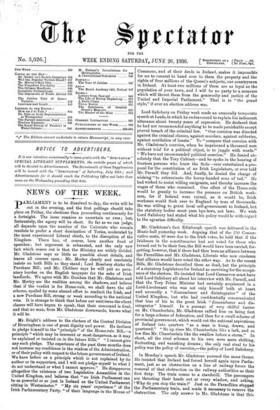Lord Salisbury on Friday week made an unusually temperate speech
at Leeds, in which he endeavoured to explain his indiscreet utterance about twenty years of repression. He declared that he had not recommended anything to be made punishable except proved breach of the criminal law. "Our coercion was directed against the criminal classes, against murders, against robberies, against mutilation of beasts." To "compare that coercion with Mr. Gladstone's coercion, when he imprisoned a thousand men without trial for a political object, is to juggle with words." "We have not recommended political coercion." He denied ab- solutely that the Tory Cabinet—and he spoke in the hearing of fourteen persons who knew the facts—ever entertained a pro- posal for the constitution of an Irish Legislature, or ever told Mr. Parnell they did. And, finally, he denied the charge of wishing "to exterminate the horny-handed sons of toil." He had wished to assist willing emigrants, and thereby increase the wages of those who remained. One effect of the Home-rule would be greatly to increase the pressure on British work- men, for if Ireland were ruined, as it would be, Irish workmen would flock over to England by tens of thousands. He was willing to grant local self-government to Ireland, but the statutory bodies must pass bye-laws, not laws. We wish Lord Salisbury had stated what his policy would be with regard to the agrarian difficulty.


































